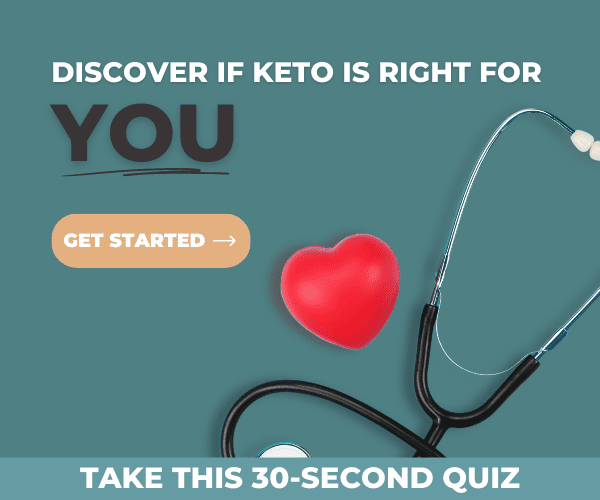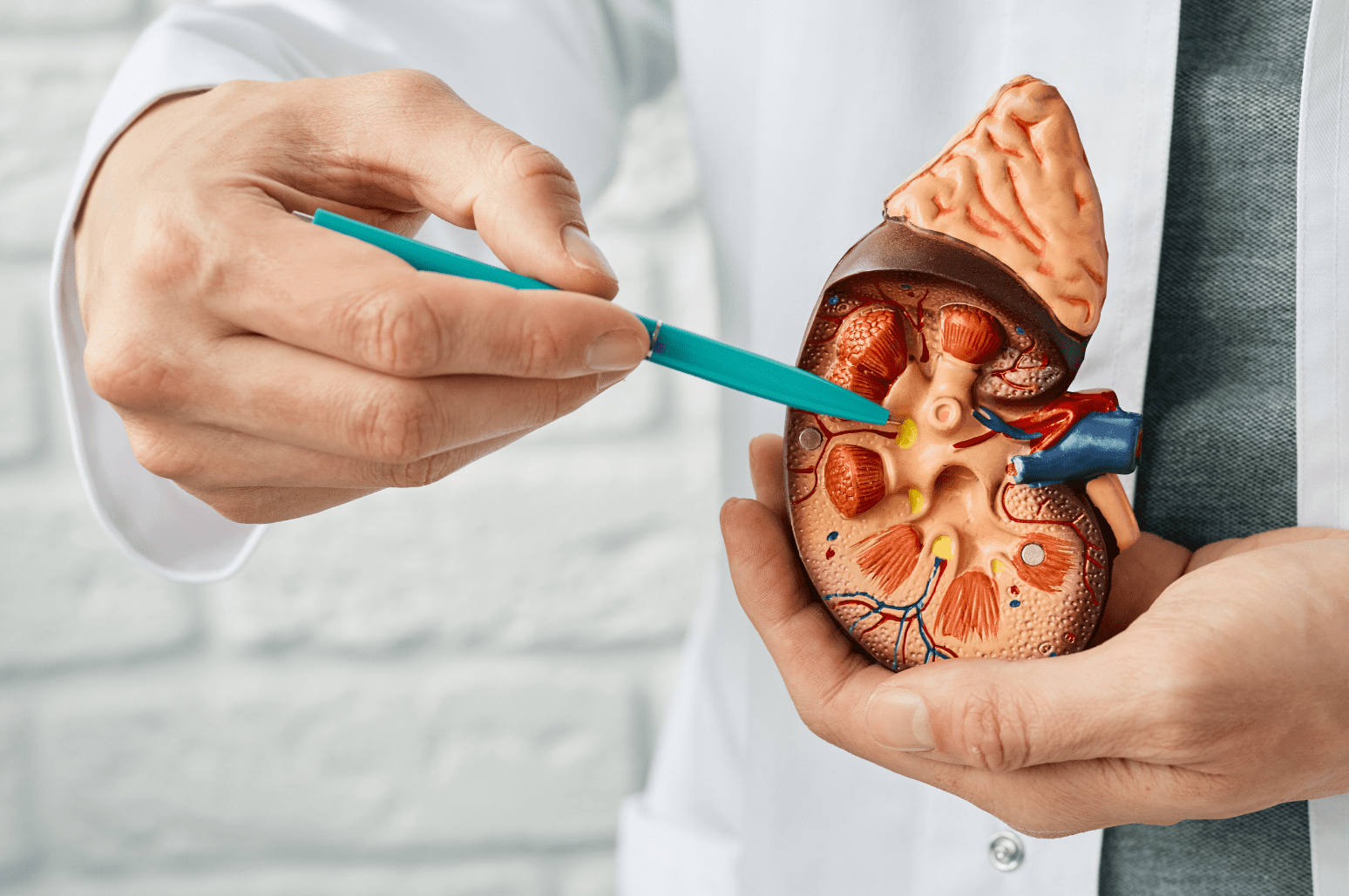
That familiar burning in your chest can put a damper on any dinner or special occasion. Dealing with heartburn is no fun, and people with this condition search for solutions to soothe digestion and relieve the pain and discomfort. If you’re following a ketogenic diet or thinking about it, you might be wondering how going keto affects heartburn. Let’s dive in.
What Is Heartburn?
Heartburn describes a burning pain in your chest behind your breastbone. The pain usually worsens after eating, when bending over or lying down, and in the later hours of the day. The discomfort is often accompanied by a bitter or acidic taste in the mouth.
Heartburn now and then isn’t a cause for concern, but frequent or more painful heartburn that interferes with your daily life warrants attention and could be the symptom of a more serious health condition.
Most people can manage heartburn on their own with certain medications, supplements, and lifestyle changes. [1]
You should always visit your doctor or healthcare practitioner if you have any questions or concerns about heartburn or your digestive or general health. You should also visit your doctor for an evaluation if you have consistent vomiting or nausea, trouble swallowing, or weight loss due to poor appetite.
Chest pain could be a sign of a heart attack. If you have severe chest pressure or pain, particularly when combined with pain in your jaw or arm and breathing difficulties, you should seek medical attention immediately.
What Causes Heartburn?
The cause of heartburn isn’t definitive, but certain factors could increase your risk, such as:
- Being overweight or obese
- Being pregnant
- Drinking excess alcohol
- Smoking
- Having a hiatal hernia
- Taking medications like aspirin, ibuprofen, sedatives, and blood pressure medications. [2] [3] [4] [5]
Heartburn is sometimes triggered by certain foods or drinks, such as:
- Onions
- Spicy foods
- Sodas
- Fried foods
- Tomato products (like ketchup)
- Citrus products
- Coffee or caffeinated drinks
- Alcohol
- Carbonated Beverages
- Large meals, especially when eaten too quickly
Your esophagus is the tube that transports your food from your mouth to your stomach. Heartburn happens when stomach acid goes back into your esophagus. A muscle band around the bottom of your esophagus (esophageal sphincter) relaxes when you swallow, enabling your foods and drinks to flow through into your stomach. After you swallow, the esophageal sphincter tightens again.
Abnormal weakening or relaxing of this muscle band results in stomach acid flowing back up into your esophagus. Your esophagus isn’t equipped to handle stomach acid like your stomach is. Stomach acid irritates the esophagus and causes the symptoms of heartburn, known as reflux.
Frequent heartburn that gets in the way of your daily routine is called gastroesophageal reflux disease (GERD). GERD can damage your esophagus over time and lead to inflammation of the esophagus (esophagitis or Barrett’s esophagus). This inflammation gradually causes changes in the esophageal lining, heightening your risk of esophageal cancer. [6]
What Are the Treatments for Heartburn?
Most doctors recommend treating heartburn with several methods, such as:
- Over-the-counter medications
- Lifestyle changes like exercise, stress management, and a nutrient-dense diet
- Vitamins and supplements
- Weight loss
- Quitting smoking
- Therapeutic exercise
- High-fiber foods that make you less likely to overeat
- Alkaline foods like cauliflower and fennel
- Watery foods like celery and cucumber
- Herbal teas and broth-based soups
- Ginger
- Apple cider vinegar
- Lemon water
- Sleeping with your head in a more elevated position
- Waiting at least 3 hours to lie down after your meals
Doctors also recommend avoiding wearing tight clothes that put pressure on your esophageal sphincter and stomach. Some healthcare practitioners recommend supplementing with digestive enzymes or stomach acid (HCL) if stomach acid is too low.
Medications or surgery might be needed if heartburn turns into a severe case of GERD.
Can a Ketogenic Diet Improve Heartburn?
The ketogenic diet could improve heartburn in several ways. Losing weight has been shown to improve heartburn and acid reflux, and the ketogenic diet is one of the most effective ways to lose weight and maintain a healthy weight. Sugar is inflammatory and could worsen any digestive issues. In fact, some research shows limiting sugar and carbohydrate intake can improve heartburn and reflux. However, going keto leaves all that sugar in the past. [7] [8]

According to Dr. John Yudkin, the author of the renowned book Pure, White, and Deadly, table sugar also leads to severe indigestion by causing the body to increase the layer of mucous membrane in the stomach. Dr. Yudkin points out that a diet high in processed carbohydrates and sucrose results in increased acidity in the digestive tract and painful heartburn or acid reflux.
Dr. Yudkin explains that a high-sugar diet requires a properly functioning pancreas. If your pancreas can’t produce enough enzymes to deal with this excess sugar, the bacteria in your intestines become imbalanced. The result is an overgrowth of opportunistic bacteria that interfere with nutrient absorption and cause gas, bloating, and increased acidity. A ketogenic diet eliminates these grains and starchy carbohydrates that feed the opportunistic bacteria. [9] [10] Certain carbohydrates including grains and other starches can also ferment and create gas, which could put pressure on your lower esophageal sphincter.
Much of the mainstream nutritional advice for avoiding heartburn aligns perfectly with a ketogenic diet, such as cutting out excess sugar and consuming more alkaline foods, fiber, vegetables, and protein. A 2004 study revealed that increasing fiber and limiting salt could protect against the symptoms of reflux. [11]
While many people improve their heartburn by increasing fiber consumption, others may actually benefit from lowering their fiber intake. Listen to your body and take time to discover what works best for you. You might keep a food diary to monitor your reactions to certain foods.
Going low carb introduces advantageous healthy fats and plenty of good quality protein. Every cell in your body has a fatty membrane and you need healthy fats to build your cells. Protein helps you build and repair muscle.
Some research involved interesting measurements, such as 24-hour esophageal pH probe tests, and concluded that going keto improved GERD and symptoms of reflux. The antioxidant, anti-inflammatory, and nutritious foods common on keto are highly beneficial for managing heartburn. Top gut-healing keto-friendly foods include bone broth, asparagus, garlic, and apple cider vinegar. Fermented foods like sauerkraut and kimchi feed the healthy bacteria in your gut and help restore balance. [12]
On the other hand, it’s possible the contents of the stomach aren’t acidic enough, which can also cause the contents to flow back up into the esophagus. Your stomach needs to be acidic enough to digest your food. Many people with acid reflux don’t have sufficient stomach acid. [13]
Without enough acid for proper digestion, foods can remain undigested in your gut longer. Factors like stress and long-term use of antacid medications can contribute to low stomach acid.
How has heartburn affected your life? Have you found relief from heartburn by following a ketogenic diet? Share your tips, thoughts, and ideas with Ketogenic.com.
References
Mayo Clinic. Heartburn. Heartburn - Symptoms and causes - Mayo Clinic
Vazquez, J. C. (2015). Heartburn in pregnancy. BMJ Clin Evid, Heartburn in pregnancy - PMC (nih.gov)
Richter, J. E., & Rubenstein, J. H. (2018). Presentation and epidemiology of gastroesophageal reflux disease. Gastroenterology, 154(2), 267-276. DOI: 10.1053/j.gastro.2017.07.045
Chang, P., & Friedenberg, F. (2014). Obesity & GERD. Gastroenterol Clin North Am, 43(1), 161-173. DOI: 10.1016/j.gtc.2013.11.009
National Institute of Diabetes and Digestive and Kidney Diseases (NIDDK). Symptoms & Causes of GER and GERD. Symptoms & Causes of GER & GERD | NIDDK (nih.gov)
Clarrett, D. M., & Hachem, C. (2018). Gastroesophageal reflux disease (GERD). Mo Med, 115(3), 214-218.
Ness-Jensen, E., Hveem, K., El-Sarag, H., & Lapergren, J. (2016). Lifestyle intervention in gastroesophageal reflux disease. Perspectives in Clinical Gastroenterology and Hepatology. https://doi.org/10.1016/j.cgh.2015.04.176
Newberry, C., & Lynch, K. (2019). The role of diet in the development and management of gastroesophageal reflux disease: Why we feel the burn. J Thorac Dis, DOI: 10.21037/jtd.2019.06.42
M Evans. Damiano, A., Handley, K., Adler, E., Siddique, R., & Bhattacharyja, A. (2002). Measuring symptom distress and health-related quality of life in clinical trials of gastroesophageal reflux disease treatment: Further validation of the gastroesophageal reflux disease symptom assessment scale (GSAS). Dig Dis Sci, 47(7), 1530-1537. DOI: 10.1023/a:1015815102175
Pointer, S. D., Rickstrew, J., Slaughter, C., Vaezi, M. F., & Silver H. J. (2016). Dietary carbohydrate intake, insulin resistance, and gastroesophageal reflux disease (GERD): A pilot study in European- and African-American obese women. Aliment Pharmacol Ther, 44(9), 976-988. DOI: 10.1111/apt.13784
Nilsson, M., Johnsen, R., Ye, W., Hveem, K., & Lagergren, J. (2004). Lifestyle related risk factors in the aetiology of gastro-oesophageal reflux. Oesophagus, http://dx.doi.org/10.1136/gut.2004.043265
Austin, G. L., Thiny, M. T., Westman, E. C., Yancy Jr, W. S., & Shaheen, N. J. (2006). A very low-carbohydrate diet improves gastroesophageal reflux and its symptoms. Dig Dis Sci, 51(8), 1307-12. DOI: 10.1007/s10620-005-9027-7
Wright, J. V., Lenard, L. (2001). Why stomach acid is good for you: Natural relief from heartburn, indigestion, reflux, and GERD. M. Evans.










